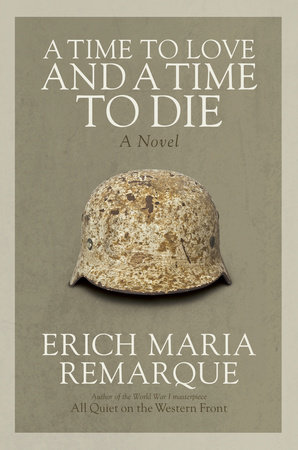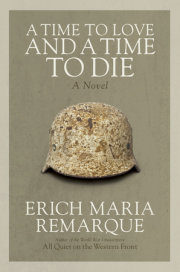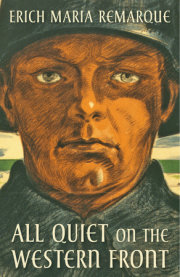Chapter One
death smelled different in Russia than in Africa. In Africa, under heavy English fire, the corpses between the lines had often lain unburied for a long time, too; but the sun had worked fast. At night the smell had come over with the wind, sweet, stifling and heavy—gas had filled the dead and they had risen like ghosts in the light of the alien stars as though they were fighting one last battle, silent, hopeless, and each for himself alone—but by the next day they had already begun to shrink, to nestle against the earth with infinite weariness as if trying to crawl into it—and if later they could be brought back some were light and dried out and the ones that were found weeks after were hardly more than skeletons that rattled loosely in uniforms suddenly far too big for them. It was a dry death, in sand, sun and wind. In Russia it was a greasy, stinking death.
It had been raining for days. The snow was melting. A month earlier it had been three yards deeper. The ruined village, which at first had seemed to be nothing but charred roofs, had silently, night by night, risen higher out of the sinking snow. Window frames had crept into sight; a few nights later the archways of doors; then stairways that led down into the dirty whiteness. The snow melted and melted, and with the melting came the dead.
They were old dead. The village had been fought over several times—in November, in December, in January, and now in April. It had been taken and lost and taken again. The snowstorms had come and covered the corpses, sometimes within hours, so deep that the medical corpsmen often could not find them—until finally almost every day had thrown a new layer of white over the devastation, like a nurse stretching a sheet over a bloody, filthy bed.
First came the January dead. They lay highest and came out at the beginning of April, shortly after the snow began to slip. Their bodies were frozen stiff and their faces were gray wax.
They were buried like boards. On a little hill behind the village where the snow was not so deep it had been shoveled away and graves were hacked out of the frozen earth. It was heavy work. Only the Germans were buried. The Russians were thrown into an open paddock. They began to stink when the weather turned mild. When it got too bad snow was shoveled over them. It was not necessary to bury them; no one expected that the village would be held for any length of time. The regiment was in retreat. The advancing Russians could bury their dead themselves.
Beside the December dead were found the weapons that had belonged to the January dead. Rifles and hand grenades had sunk deeper than the bodies; sometimes steel helmets too. It was easier with these corpses to cut away the identification marks inside the uniforms; the melting show had already softened the cloth. Water stood in their open mouths as though they had drowned. In some cases a limb or two had thawed out. When they were carried off, the bodies were still stiff, but an arm and a hand would dangle and sway as though the corpse were waving, hideously indifferent and almost obscene. With all of them, when they lay in the sun, the eyes thawed first. They lost their glassy brilliance and the pupils turned to jelly. The ice in them melted and ran slowly out of the eyes—as if they were weeping.
Suddenly it froze again for several days. A crust formed on the snow and turned to ice. The snow stopped sinking. But then the sluggish, sultry wind began to blow anew.
At first only a gray fleck appeared in the withering white. An hour later it was a clenched hand stretching upward.
“There’s another,” Sauer said.
“Where?” Immermann asked.
“Over there in front of the church. Shall we dig him out?”
“What’s the use? The wind will dig him out by itself. The snow back there is still a yard or two deep, at least. This damn village is lower than anything else around here. Or do you just want to get your boots full of ice water?”
“Hell no. Any idea what’s to eat today?”
“Cabbage. Cabbage with pork and potatoes. Pork nonexistent.”
“Cabbage of course! For the third time this week!”
Sauer unbuttoned his trousers and began to urinate. “A year ago I still pissed in great arcs,” he explained morosely. “In good military fashion, the way it’s supposed to be done. I felt fine. Advance each day so-and-so many kilometers. Thought I’d soon be home again. Now I piss like a civilian, half-heartedly and without pleasure.”
Immerman stuck his hand under his uniform and scratched himself comfortably. “I wouldn’t care how I pissed—if I were a civilian again.”
“Me either. But it looks like we’d go on being soldiers forever.”
“Sure. Heroes to the grave. Only the S.S. still piss in great arcs.”
Sauer buttoned up his trousers. “They can do it too. We do the dirty work and those beauties get all the honors. We fight for two or three weeks for some damn town and on the last day up come the S.S. and march into it triumphantly ahead of us. Just look at the way they’re looked after! Always the thickest coats, the best boots, and the biggest chunks of meat!”
Immermann grinned. “Now even the S.S. aren’t taking towns any more. They’re going back. Just like us.”
“Not like us. We don’t burn and shoot what we can’t carry off with us.”
Immerman stopped scratching himself. “What’s got into you today?” he asked in surprise. “You’re talking like a human being. Take care Steinbrenner doesn’t hear you or you’ll soon find yourself in one of those disciplinary companies. Look—the snow over there has settled! Now you can see a piece of the fellow’s arm.”
Sauer looked over. “If it goes on melting like this by tomorrow he’ll be hanging on a cross. He’s in the right place. Right over the cemetery.”
“Is that a cemetery there?”
“Of course. Didn’t you know? We were here once before. During our last counterattack. Around the end of October. Weren’t you with us then?”
“No.”
“Where were you? Hospital?”
“Disciplinary company.”
Sauer whistled through his teeth. “Disciplinary company! I’ll be damned! For what?”
Immermann looked at him. “Former Communist,” he said.
“What? And they let you out? How did it happen?”
“A fellow has to have luck. I’m a good mechanic. Apparently they are more useful now here than there.”
“Maybe. But as a Communist! And here in Russia! They’re always sent somewhere else.” Sauer suddenly looked at Immermann with suspicion.
Immermann grinned derisively. “Take it easy,” he said. “I haven’t turned spy. And I won’t report what you said about the S.S. That’s what you meant, wasn’t it?”
“I? Not a bit of it. Never thought of such a thing!” Sauer reached for his mess kit. “There’s the field kitchen! Quick—otherwise we’ll only get dishwater.”
The hand grew and grew. It was not as if the snow were melting but as if the hand were slowly stretching up out of the earth—like a pale threat or a paralyzed gesture for help.
The company commander halted abruptly. “What’s that over there?”
“Some Panje or other, sir.”
Rahe looked more intently. He could recognize a piece of the faded cloth on the sleeve. “That’s no Russian,” he said.
Sergeant Muecke wriggled his toes in his boots. He could not bear the company commander. To be sure, he stood before him with irreproachable rigidity—discipline transcended personal feelings—but privately, to express his contempt, he kept wriggling his toes in his boots. Stupid ass, he thought. Numbskull!
“Get him out,” Rahe said.
“Yes, sir.”
“Get a couple of men to work at once. That sort of thing’s not a pleasant sight!”
Babe in arms, Muecke thought. Twaddler! Not a pleasant sight! As though that was the first dead man we’ve seen!
“That’s a German soldier,” Rahe said.
“Yes, sir. For the last four days we’ve found nothing but Russians.”
“Have them get him out. Then we’ll see what he is.” Rahe walked across to his quarters. Conceited ass, Muecke thought. Has an oven, a warm house, and the Ritterkreuz. I haven’t even the Iron Cross first class and I’ve done just as much to earn it as he has with his whole hardware store. “Sauer!” he shouted. “Immermann! Come here! Bring shovels along! Who else is there? Graeber! Hirschland! Berning! Steinbrenner, take charge of the detail! That hand over there! Dig it out and bury it if it’s a German! I bet it isn’t.”
Steinbrenner sauntered over. “You’re betting?” he asked. He had a high, boyish voice which he vainly tried to keep low. “How much?”
Muecke was disconcerted for a moment. “Three rubels,” he said then. “Three occupation rubels.”
“Five. I don’t bet less than five.”
“All right, five then. But pay up.”
Steinbrenner laughed. His teeth glistened in the pale sunlight. He was nineteen years old, blond, with the face of a Gothic angel. “Pay up of course. What else, Muecke?”
Muecke did not like Steinbrenner either; but he was afraid of him and therefore cautious. Steinbrenner came from the S.S. He possessed the golden insigne of the Hitler Youth. Now he belonged to the company, but everyone knew he was an informer and a Gestapo spy.
“All right, all right.” Muecke pulled out of his pocket a cherrywood cigarette case that had a flower design burnt into its lid. “Cigarette?”
“Sure.”
“The Fuehrer doesn’t smoke, Steinbrenner,” Immermann said casually.
“Shut your trap.”
“Shut yours, you bastard.”
Steinbrenner lifted his long eyelashes in a sidewise glance. “You seem to be feeling pretty good. Forgotten all sorts of things, haven’t you?”
Immermann laughed. “I don’t easily forget anything. And I know just what you mean, Max. But don’t you forget what it was I said: The Fuehrer doesn’t smoke. That was all. Here are four witnesses. And the Fuehrer doesn’t smoke. Everyone knows that.”
“Stop jawing!” Muecke said. “Get on with the digging. Orders from the company commander.”
“All right, move!” Steinbrenner lighted the cigarette Muecke had given him.
“Since when is smoking permitted on duty?” Immermann asked.
“We’re not on duty,” Muecke explained irritably. “Now cut the talk and get going! Hirschland, you too!”
Hirschland came up. Steinbrenner grinned. “First-rate work for you, Isaac! Digging out corpses. Good for your Jewish blood. Strengthens the bones and the spirit. Take that shovel over there.”
“I’m three-quarters Aryan,” Hirschland said.
Steinbrenner blew smoke from the cigarette into his face. “That’s what you say! As far as I’m concerned you’re one-quarter Jew—and through the generosity of the Fuehrer you’re allowed to fight side by side with true German men. So, dig out this Russian swine. He stinks too much for the Lieutenant’s delicate nose.”
“This is no Russian,” Graeber said. He had dragged a few boards up to the dead man and by himself begun to cut away the snow from around the arm and breast. The wet uniform was now clearly visible.
“Not a Russian?” Steinbrenner came over, quick and surefooted as a dancer on the teetering boards, and squatted down beside Graeber. “It’s a fact. That’s a German uniform.” He turned around. “Muecke! It’s not a Russian! I’ve won!”
Muecke walked over heavily. He stared at the hole into which water was slowly trickling from the sides. “I can’t understand it,” he declared disgustedly. “For almost a week now we’ve found nothing but Russians. He must be one of the December lot that sank deeper.”
“He might just as well be from October,” Graeber said. “Our regiment came through here then.”
“Nonsense. There can’t be any more of them left.”
“There could be. We fought a night engagement here. The Russians retreated and we had to go on at once.”
“That’s true,” Sauer announced.
“Nonsense. Our replacements must have found all the dead and buried them.”
“That’s not so certain. By the end of October it had started to snow very hard. And at that time we were still advancing fast.”
“That’s the second time you’ve said that.” Steinbrenner looked at Graeber.
“I’ll be glad to let you hear it again if you like. At that time we were counterattacking and we advanced more than a hundred kilometers.”
“And now we’re retreating, eh?”
“Now we’re here again.”
“That means that we’re in retreat, doesn’t it?”
Immermann nudged Graeber warningly. “Are we perhaps going forward?” Graeber asked.
“We’re shortening our lines,” Immermann said, staring derisively into Steinbrenner’s face. “For a year now. Strategic necessity. Everyone knows that.”
“There’s a ring on his hand,” Hirschland said suddenly. He had gone on digging and had exposed the dead man’s other hand. Muecke bent down. “A ring,” he said. “And a gold one too. A wedding ring.”
All of them looked at it. “Watch yourself,” Immermann whispered to Graeber. “That swine will do you out of your furlough. He’ll report you as an alarmist. He’s just waiting for the chance.”
“He’s simply showing off. You’re the one who’d better watch out. He’s got it in for you more than for me.”
“I don’t care. I won’t get any furlough.”
“Those are the insignia of our regiment,” Hirschland said. He had gone on digging with his hands.
“So then it’s dead certain that it’s not a Russian, eh?” Steinbrenner turned and grinned at Muecke.
“No, it’s not a Russian,” Muecke replied angrily.
“Five rubels! Too bad we didn’t bet ten. Cough it up!”
“I haven’t got it on me.”
“Where then? In the Reichsbank? Come on, cough it up!”
Muecke glared fiercely at Steinbrenner. Then he produced his wallet and handed over the money. “Everything’s gone wrong today, damn it!”
Steinbrenner pocketed the money. Graeber bent over again to help Hirschland dig. “I believe it’s Reicke,” he said.
“What?”
“This is Lieutenant Reicke. There are his bars. And here, on his right hand, the last joint of the index finger is missing.”
“Nonsense. Reicke was wounded and sent home. We heard that later.”
“It is Reicke.”
“Clean off his face.”
Graeber and Hirschland went on digging. “Careful,” Muecke shouted. “Don’t poke him in the head.”
“He won’t feel it now,” Immermann said.
“Shut your trap. Here lies a fallen German officer, you Communist!”
The face emerged from the snow. It was wet and made a strange impression with the hollows of the eyes still filled with snow: as though a sculptor had left a mask unfinished and blind. A gold tooth gleamed between the blue lips.
“I can’t identify him,” Muecke said.
“It must be him. We didn’t lose any other officer here that time.”
“Wipe out his eyes.”
Graeber hesitated an instant. Then he cautiously wiped the snow away with his glove. “It’s him,” he said.
Copyright © 1998 by Erich Maria Remarque. All rights reserved. No part of this excerpt may be reproduced or reprinted without permission in writing from the publisher.









